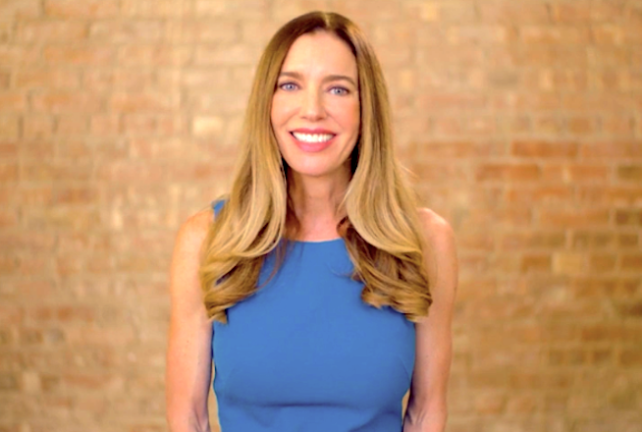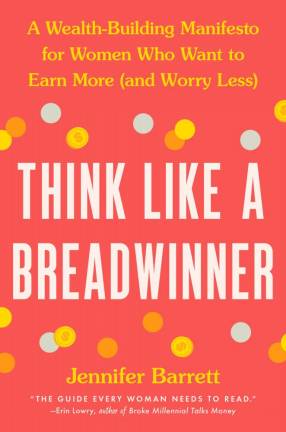The Bread and Butter Behind Women Taking Control of Their Finances
In her new book, Jennifer Barrett advises her female peers on the importance of making thoughtful decisions with their money in order to plan for the futures they desire


In the opening scene of “Think Like a Breadwinner,” Jennifer Barrett is having an epiphany that would ultimately change her life. The flashback shows her looking around her Brooklyn apartment, which she shared with her husband and toddler, realizing that she was relying on her husband, who was bouncing back from a layoff a few years prior, to be the primary breadwinner for their household. Then an editor at Newsweek, Barrett had dreams to grow her family and own a home, and started contemplating that maybe she needed to step up into the role of main breadwinner, one which is not taught to be the responsibility of a woman.
In her new book, Barrett counsels women on how to be empowered financially and make smart choices with their money so that they don’t have to rely on their partner to be able to afford the things they want in life. The mom of two and chief education officer at the financial wellness app Acorns stresses the importance of looking to the future by wealth building through investing and saving, not just covering the bills while living paycheck to paycheck.
For this must-read for females of all ages and income levels, Barrett interviewed more than 100 women nationwide and highlights many of their stories throughout its enlightening pages. She assures readers that the once-societal norms are changing, and although we still have a ways to go, women are not alone in the journey to find financial freedom.
Tell us your family’s history of breadwinners and how that inspired you.
I do come from a line of female breadwinners, but it’s not quite as straightforward as that sounds. So my nana, or my mom’s mom, stopped working when she had my mom and my aunt. And about a decade later, my grandfather came back from a business trip and told her that he had met someone, and filed for a divorce. She was completely blindsided and I think she really wanted to take her future into her own hands at that point. She went back to work as a secretary and she started investing through a broker, and she just invested in everything that she spent money on or wrote checks to, so everything from utility companies to retail stores. And she continued to do that for the rest of her life. And when she passed, my mom and I were really surprised to learn that her portfolio was worth almost half a million dollars. So that was a real lesson for me. And what it told me was that it’s not just about the money that you earn in your job, it’s about taking some of those paychecks and investing them so that that money can grow.
My mom actually had stayed home with us, so my dad was the sole and then primary breadwinner for most of my childhood. But after my parents divorced, my mom got an MBA and went back to work and she got remarried, and stepped into the role of managing the investments for she and my stepfather. So she served as a role model in that sense as well in that once she went back to work, she was very ambitious. She became a professor and a consultant, and really taught herself how to invest and used her accounting skills to do that very smartly and helped her investments grow quite a bit over that time.
In the book, you acknowledge that you felt angry at first about being the breadwinner.
When I had this wake-up call, I thought I was doing okay financially. I had a steady paycheck, I was making a decent amount of money, contributing half the bills and paying half the rent, had a 401K, a little bit of savings, paying off my credit card debt. We had a toddler and I had this moment where I looked around my little one-bedroom apartment and realized that we were in an unsustainable situation. And I wanted so much more, I wanted to have another child. We wanted to stay in New York. We needed to buy a home or rent a bigger place so that we could accommodate our growing family. And I realized that I wasn’t really taking the steps with my money to make sure that those things came to pass. That was the moment that I realized that a lot of the money choices I’ve made were informed by this subconscious belief that my husband would take the lead in terms of financially planning for our future, just as my dad had ... I actually didn’t expect to move into the main breadwinner role. And when I did, I was pregnant with our second child and I came up right up against the expectations that I had for myself and that I felt our culture had for me as a mother in terms of being the primary caregiver. And I was trying to do both. I was trying to be the primary caregiver and the primary breadwinner, and I just couldn’t manage to do it all. I think, initially, that showed up as resentment for my husband because it wasn’t what I expected and I also felt unprepared to be in this role.
That leads me to my next question, which you pose in the book, can women have it all? Explain that notion and the woman who coined the expression.
Helen Gurley Brown, I met her when I was working at Hearst ... I think the irony is that when she coined the term, she wasn’t even talking about having kids. She never had kids. She wasn’t talking about having a successful career and a successful family. She was talking about having love, sex and money and a career. I think the question shouldn’t be, “Can we have it all?” The question should be, “What do I want in my life and what are the choices I need to make with my money and my career in order to support that?” And that’s a much more empowering way to think of your life and your capabilities. So I think we took this idea of having it all, somehow it became having a successful career and a successful family. And it became this artificial bar that we needed to measure ourselves against. And I think it really is so damaging to compare yourself to some false idea of what success is. And so, in the book, I talk about how either we want to get rid of having it all altogether, or really just own and redefine it.
To research, you spoke to over 100 diverse women. Can you highlight one story that stands out?
One of the stories that struck me is Kameka. When she grew up, her family did not have a lot of money. And very early on in her career, she worked with an organization that helps kids that came from disadvantaged backgrounds. Through that, she was able to get an internship that paid. While she was working there, someone said to her, “With this 401K, if you max it out, the company will match it.” The employer had a pretty good match program. She said she really didn’t know much about it, but she thought that made a lot of sense. So she put in enough money to get it matched. And she continued to do that throughout her career, and now she’s in her 40s, and she was telling me that she had done some calculations with her advisor recently, and learned that if she didn’t put another dollar into her retirement account, she was still on track to have a million dollars by the time she retired.
How do you think women can invest while living in New York, where many live paycheck to paycheck?
I’m very sympathetic because I was practically living paycheck to paycheck myself when I had my wake-up call and so I know how challenging it can be when you feel like you’re barely getting by to even think about taking some of your paycheck and saving and investing it certainly outside of any retirement plan you have at work. So I would say just start small, because the most important thing is just to get started. And a really magical thing starts to happen when you put money into high-yield savings and invest it into stock and bonds and see it grow over time. I think it really helps you shift your mindset as well, because a lot of times when we’re living paycheck to paycheck, we feel stuck. And a lot of Americans, and women, in particular, will say, “I live paycheck to paycheck. When I make more, I’ll save more.” But when we’re talking like that, we’re reinforcing this belief and normalizing it and it makes it that much harder to get out of that.
To learn more, visit www.jenniferbarrett.com